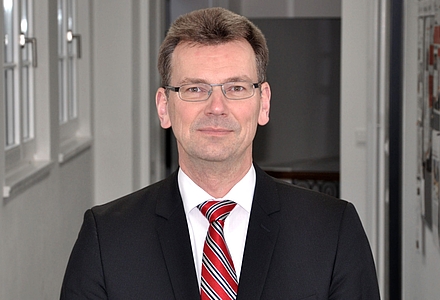
- Prof. Dr. Axel Gerloff
| Funktion(en) | Kontaktdaten | Sprechzeiten | ||
|---|---|---|---|---|
Professor International Business |
|
- Monetary Economics
- International Business
- International Economics/International Finance
- European Integration
- Economic Policy/Wirtschaftspolitik
- Internationalisierung der Hochschule
- seit 2012 Leiter Internationale Beziehungen der DHBW
- bis 2012 Studiengangsleiter BWL - International Business
- seit 2003 Professor für BWL - International Business
- ab 2003 Aufbau Campus Bad Mergentheim und Studiengang BWL - International Business
- Microeconomics
- Macroeconomics
- Money and Currency
- Economic Policy / Wirtschaftspolitik
- Investment and Finance
- International Business
- Intercultural Management
- seit 2015 Gastdozent Europäische Wirtschaftsakademie, Madrid, Spanien
- seit 2010 Gastprofessur Oregon State University, College of Business, Corvallis, USA
- regelmäßige Gastvorträge University of North Florida, Coggin College of Business, Florida, USA
- 2008 Gastprofessur University of North Florida, Coggin College of Business, Florida, USA
Mitgliedschaften: Gründungsmitglied Center of Globalization and Europeanization of the Economy (CeGE) an der Universität Göttingen, Mitglied Verein für Socialpolitik (VfS), Mitglied Lions Club International, Mitglied Board of Directors WACE (World Association for Cooperative & Work-Integrated Education)
| seit 2012 | DHBW Präsidium, Zentrale Auslandskoordination, Leiter Internationale Beziehungen |
| 2003 – 2012 | DHBW Mosbach, Campus Bad Mergentheim, Studiengangsleiter BWL – International Business |
| seit 2003 | DHBW Mosbach, Campus Bad Mergentheim, Professor für BWL – International Business |
| 2001 | Dissertation, Wirtschaftswissenschaftliche Fakultät der Georg-August-Universität Göttingen, (Betreuer: Prof. Dr. Hans-Joachim Jarchow) |
| 2000 – 2003 | Analyst für Mittel- und Osteuropa, Volkswirtschaftliche Abteilung der Dresdner Bank AG, Frankfurt am Main, Länderrisikoanalyse |
| 1994 – 2000 | zunächst studentische Hilfskraft, dann wissenschaftliche Hilfskraft und wissenschaftlicher Mitarbeiter, Volkswirtschaftliches Seminar der Georg-August-Universität Göttingen |
| 1990 – 1996 | Studium der Volkswirtschaft, Georg-August-Universität Göttingen und University of California, Los Angeles |
| ab 1990 | diverse befristete Beschäftigungen, Deutsche Bank AG, Dresdner Bank AG, DB Research, Investitionsbank Nordrhein-Westfalen, 4P Rube Göttingen GmbH, Sparkasse Göttingen |
| 1988 – 1990 | Ausbildung zum Bankkaufmann, Deutsche Bank AG in Hamburg |
- Fiscal Stability in the Eurozone, in: European Integration Process in the New Regional and Global Settings, edited by Ewa Latoszek, Irena E. Kotowska, Alojzy Z. Nowak, Andrzej Stepniak, WWZ Wydawnictwo Naukowe, Wydzialu Zarzadzania, Uniwersytetu Warszawskiego, Warsaw 2012, pp. 169 – 181.
- The European Union’s Approach to the European Debt Crisis and the Sustainability of the Euro Area, International Business: Research, Teaching and Practice, Vol. 5, No. 2, 2011, pp. 22 – 47.
- Wechselkurspolitik in Mittel- und Osteuropa – Eine theoretische Analyse unter besonderer Berücksichtigung der Erfahrungen der zehn Kandidaten für eine EU-Osterweiterung, CeGE-Schriften, Vol. 1, Peter Lang Verlag, Frankfurt am Main, 2001. (Dissertation) Stylized Facts About Stabilization in Central and Eastern Europe, International Advances in Economic Research, Vol. 6, No. 2, May 2000, pp. 127 – 149.
- Stabilization during the Early Years of Transition – Some Stylized Facts, Discussion Paper, Diskussionsbeiträge aus dem Volkswirtschaftlichen Seminar der Universität Göttingen, March 1999.
- Die Umstellung der DM auf den Euro, WiSt Wirtschaftswissenschaftliches Studium, 27. Jg., Heft 11, 1998, S. 589 – 91.
Beiträge in Bankveröffentlichungen:
- Czech Republic: Situation on the currency front eases, Facts, Figures, and Forecasts, No. 03/2003, p. 36, March 2003. (Dresdner Bank).
- Russia: Direct investment turns positive, Facts, Figures, and Forecasts, No. 03/2003, p. 42, March 2003. (Dresdner Bank).
- Poland: Political wobbles, Facts, Figures, and Forecasts, No. 03/2003, p. 40, March 2003. (Dresdner Bank).
- Czech Republic: EU integration calls for austerity drive, Facts, Figures, and Forecasts, No. 12/2002, p. 36, December 2002. (Dresdner Bank).
- Russia: Plans to liberalize capital transactions, Facts, Figures, and Forecasts, No. 12/2002, p. 41, December 2002. (Dresdner Bank).
- Poland: Over the worst, Facts, Figures, and Forecasts, No. 12/2002, p. 40, December 2002. (Dresdner Bank).
- (co-author: Sven Schubert) Czech Republic: Floods denting growth?, Facts, Figures, and Forecasts, No. 09/2002, p. 37, September 2002. (Dresdner Bank).
- Russia: Sound budget planning, Facts, Figures, and Forecasts, No. 09/2002, p. 45, September 2002. (Dresdner Bank).
- Poland: Light at the end of the tunnel?, Facts, Figures, and Forecasts, No. 09/2002, p. 44, September 2002. (Dresdner Bank).
- Czech Republic: Koruna climbs to record high, Facts, Figures, and Forecasts, No. 06/2002, p. 41, June 2002. (Dresdner Bank).
- Russia: Booming stock market, Facts, Figures, and Forecasts, No. 06/2002, p. 51, June 2002. (Dresdner Bank).
- Poland: Bickering over monetary policy, Facts, Figures, and Forecasts, No. 06/2002, p. 50, June 2002. (Dresdner Bank).
- (co-authors: Ingrid Davey, Gregor Eder, and Regina Vitez) Investing in Central and Eastern Europe, May 2002. (Dresdner Bank).
- Czech Republic: Strong koruna, Facts, Figures, and Forecasts, No. 03/2002, p. 37, March 2002. (Dresdner Bank).
- Russia: More active debt management, Facts, Figures, and Forecasts, No. 03/2002, p. 45, March 2002. (Dresdner Bank).
- Poland: Bottoming out, Facts, Figures, and Forecasts, No. 03/2002, p. 44, March 2002. (Dresdner Bank).
- What is meant by ... euroization?, Trends – Economic analyses, 1st quarter 2002, p. 7. (Dresdner Bank).
- (co-author: Rainer Schäfer) Russia: On the path to reform – Economic policy without experiments, Facts, Figures, and Forecasts Update, January 2002. (Dresdner Bank).
- Czech Republic: Economy buoyed by domestic demand, Facts, Figures, and Forecasts, No. 12/2001, p. 41, September 2001. (Dresdner Bank).
- Russia: Flexible budget draft, Facts, Figures, and Forecasts, No. 12/2001, p. 50, December 2001. (Dresdner Bank).
- Poland: New government facing old tasks, Facts, Figures, and Forecasts, No. 12/2001, p. 48, December 2001. (Dresdner Bank).
- (co-author: Wolfram Merzyn) Ukraine: Growth in the face of stalling reforms, Facts, Figures, and Forecasts, No. 09/2001, p. 56, September 2001. (Dresdner Bank).
- Czech Republic: Expansionary economic policy, Facts, Figures, and Forecasts, No. 09/2001, p. 40, September 2001. (Dresdner Bank).
- Russia: Twin surplus, Facts, Figures, and Forecasts, No. 09/2001, p. 49, September 2001. (Dresdner Bank).
- Poland: Budget on the brink of collapse?, Facts, Figures, and Forecasts, No. 09/2001, p. 48, September 2001. (Dresdner Bank).
- (co-author: Astrid Gelbrich) Kasachstan: Wirtschaftsboom durch hohe Ölpreise, Außenwirtschaftsnachrichten, September 2001, S. 21 – 23. (Dresdner Bank).
- What is meant by ... ‚currency board’?, Trends – Economic analyses, 3rd quarter 2001, p. 7. (Dresdner Bank).
- EU Accession: Two paths to the euro, Emerging Markets Monitor, July 4, 2001. (Dresdner Bank).
- Czech Republic: State budget the Achilles’ heel, Facts, Figures, and Forecasts, No. 06/2001, p.41, June 2001. (Dresdner Bank).
- Russia: Inflation out of control, Facts, Figures, and Forecasts, No. 06/2001, p. 50, June 2001. (Dresdner Bank).
- Poland: Further rate cuts likely, Facts, Figures, and Forecasts, No. 06/2001, p. 49, June 2001.(Dresdner Bank).
- Czech Republic: Surprise interest rate cut, Facts, Figures, and Forecasts, No. 03/2001, p. 41, March 2001. (Dresdner Bank).
- Russia: Record trade surplus just a one-off, Facts, Figures, and Forecasts, No. 03/2001, p. 51, March 2001. (Dresdner Bank).
- Poland: Zloty riding high, Facts, Figures, and Forecasts, No. 03/2001, p. 50, March 2001. (Dresdner Bank).
- Lithuania: Goodbye to the dollar peg?, Emerging Markets Monitor, January 10, 2001. (Dresdner Bank).
- (co-authors: Ingrid Davey and Regina Vitez) Investing in Central and Eastern Europe, February 2001. (Dresdner Bank).
- (co-author: Elke Speidel-Walz) Emerging Markets: Indicators for Banking Sector Distress, Frankurt Voice, February 28, 2000, pp. 12 – 15. (Deutsche Bank Research).
